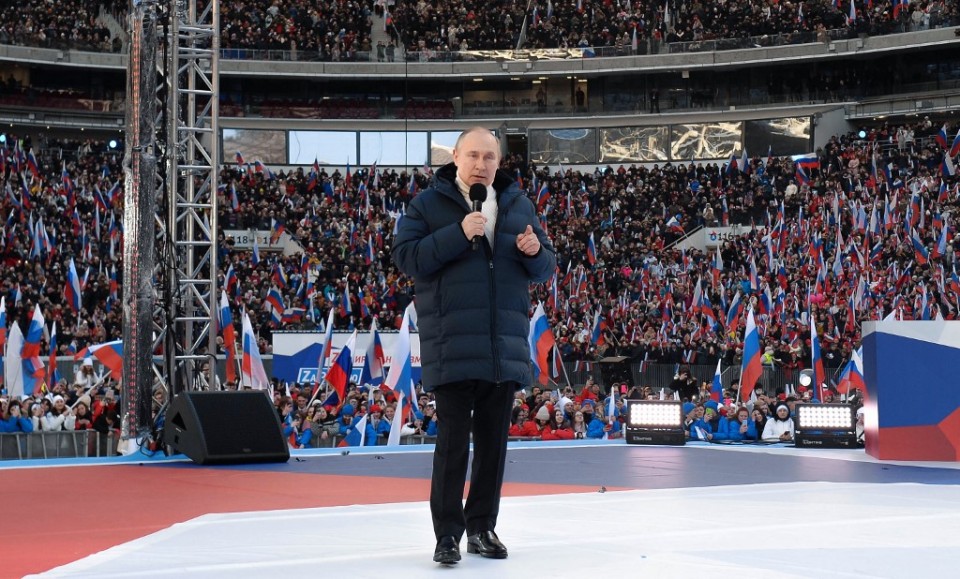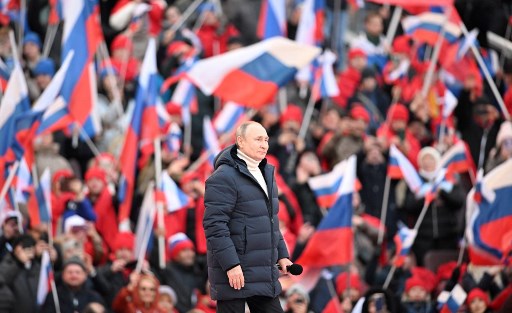
by Marina LAPENKOVA
Agence France Presse
MOSCOW, Russia (AFP) — Like many members of Russia’s affluent middle class, advertising producer Rita Guerman had long opposed Kremlin strongman Vladimir Putin.
But punishing Western sanctions following Putin’s decision to send troops to Ukraine in late February has changed her opinion of the Russian leader.
“I have opened my eyes,” said the 42-year-old, praising the Russian president for defending the country “against NATO”.
The West has pummelled Russia with unprecedented sanctions to penalise Putin for his military campaign in pro-Western Ukraine that has killed thousands of people including civilians and displaced more than 11 million.
Western powers hoped the sanctions would help weaken public support for the Kremlin but observers say that the debilitating penalties have had an opposite effect in many ways.
After the initial shock and disbelief, many members of the largely pro-Western middle class, like Guerman, felt that they have been treated unfairly by the West and are now rallying behind Putin.
The latest sanctions have hit Russians indiscriminately, stripping them of contracts with foreign companies, European vacations, Visa- and Mastercard-branded credit cards, and access to Western medicines.

When Putin sent troops to Ukraine on February 24 Guerman was finishing a commercial for a Ukrainian company. Shaken at first, she wanted to make a donation to the Ukrainian army. Then she spent two weeks reflecting and listening to “historians and experts in geopolitics” and emerged a Putin supporter.
“A normal person cannot accept war. It’s tearing me apart, but we are talking about the sovereignty of Russia,” Guerman told AFP.
“All bets are off: Putin had no choice but to enter Ukraine to protect us from the Anglo-Saxons.”
As a result of the sanctions, she said she had lost all her foreign clients and work with domestic ones has also dried up.
“We are under siege,” she said, adding that she had reconsidered her values. “There is Coca Cola and iPhones. And there are existential values.”
– ‘Demonization of Russians’ –
According to a recent study by the independent Levada pollster, in March 83 percent of respondents said they approved of Putin’s work, up from 65 percent in December last year.
But many sociologists say that polls do not provide an objective picture during a military conflict, with criticism of the authorities essentially outlawed.
After the start of the military campaign in Ukraine, Russian authorities have imposed prison terms of up to 15 years for spreading “fake news” about the Russian army.
Opposition media have either been banned or forced to suspend operations, while television channels have ratcheted up production of anti-Ukraine and anti-West propaganda.
Natalia Tikhonova, chief researcher at the Institute of Sociology of the Russian Academy of Sciences, said many members of the middle class do not understand why they have to collectively share responsibility for Putin’s actions in Ukraine when they never voted for Putin.
“The demonisation of Russians as a nation in Europe is only pushing them to rally around the flag,” Tikhonova told AFP.
More than 15,000 people were detained at protests in Russia after the start of the conflict but those demonstrations quickly petered out. Tens of thousands of Russians — most of them well-educated professionals — have left the country in protest.
Those who have stayed behind are adjusting to a harsh new reality and many agree with the Kremlin narrative that the West is waging a “total war” against the Russians.
“Regardless of their opposition to the operation in Ukraine, the middle class has mobilised in support of Putin and against the West,” said Tikhonova, pointing out that around 60 percent of those people used to consider themselves “close to Europeans.”
– ‘The anti-West’ –
Alexander Nikonov, a 37-year-old Muscovite, said that “anti-Russian hysteria” was now raging in the world, adding that Russians should close ranks.
“This is not the time for squabbles,” he told AFP.
“Even my colleagues who used to be openly critical of the authorities have now become less vocal,” Nikonov said in a central Moscow bookstore where he bought a collection of Russian fairy tales.
“They are more uplifting and ironic than those in Europe,” he said.
Some Russian socialites — who usually prefer to steer clear of politics — have also taken sides.
Actress Marina Ermoshkina urged Russian influencers to cut up their Chanel handbags to protest the luxury brand’s decision to cut off sales to Russia.
Ermoshkina, who has more than 300,000 followers on Instagram, put a picture of herself cutting up a Chanel bag with garden shears to protest “Russophobia.”
Political observer Maxim Shevchenko said that by destroying the livelihood of pro-Western Russians the West was strengthening Putin’s regime.
“The new Russian bourgeois — the most liberal part of society — are the only ones who can resist Putin,” said Shevchenko.
Another political analyst, Georgy Bovt, struck a similar note.
“The economic war that the West has declared against the Russians regardless of their political beliefs, has rallied them more than all the Kremlin propaganda in recent years,” he told AFP.
“By refusing to separate the nation from its leader, the West will see a new state emerge near its borders — the anti-West.”
© Agence France-Presse








